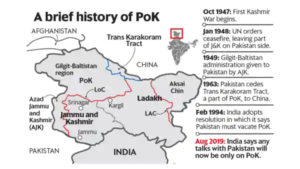In news
Elections held in Pakistan Occupied Kashmir (PoK) recently.
About PoK
Evolution of PoK
- PoK, which Pakistanis call “Azad Jammu & Kashmir” (AJK), came into being after the 1949 ceasefire between India and Pakistan after the Kashmir war.
- It comprises the parts of the erstwhile state of Jammu and Kashmir that were occupied by the Pakistani forces.
Territory of PoK & type of rule
- The territory of PoK comprises 10 districts under three divisions — Mirpur, Muzaffarabad, and Poonch.
- The capital is Muzaffarabad.
- While PoK is ostensibly an autonomous, self-governing territory, the Pakistan Army is the final arbiter on all matters Kashmir — and the security establishment exercises tight control over what goes on in PoK.
- The President of AJK is the constitutional head of state, while the Prime Minister, supported by a Council of Ministers, is the chief executive.
- For all practical purposes, PoK is run by the Pakistan government through the all-powerful Kashmir Council, a nominated 14-member body headed by the Prime Minister of Pakistan.
- Six members are nominated by the Pakistan government and eight are from the PoK Assembly and government, including the “prime minister” of “Azad Kashmir”.
- The territory shares a border to the north with Gilgit-Baltistan, together with which it is referred to by the United Nations and other international organizations as “Pakistani-administered Kashmir”
- It also shares borders with the Pakistani provinces of Punjab and Khyber Pakhtunkhwa to the south and west, respectively.
- On its eastern side, Azad Kashmir is separated from the Indian union territory of Jammu and Kashmir (part of Indian-administered Kashmir) by the Line of Control (LoC), which serves as the de facto border between the Indian- and Pakistani-controlled parts of Kashmir.

PoKs Constitutional position (Pakistan’s Constitution)
- Pakistan’s constitutional position on PoK is that it is not a part of the country, but the “liberated” part of Kashmir.
- The constitution of Pakistan lists the country’s four provinces Punjab, Sind, Balochistan, and Khyber Pakhtunkhwa.
- Article 1 of the constitution, which lists out the territories of Pakistan, also has a provision for “such States and territories as or may be included in Pakistan, whether by accession or otherwise”.
- The one direct reference to Jammu and Kashmir in Pakistan’s constitution is in Article 257, which says: “When the people of the State of Jammu and Kashmir decide to accede to Pakistan, the relationship between Pakistan and the State shall be determined in accordance with the wishes of the people of that State.”
- The PoK constitution has a clear injunction against persons or political parties propagating “against or taking part in activities prejudicial to the ideology of the state’s accession to Pakistan”.
- An Assembly member invites disqualification for doing this, and candidates have to sign an affidavit swearing allegiance to Kashmir’s accession to Pakistan.
Elections in PoK & its Assembly
- The PoK Assembly has 53 seats, including four that were added in 2019. Over 700 candidates are in the fray, and there are about 20 lakh voters.
- The first direct elections in the territory were held in 1970.
- “AJK” got its own “interim” constitution (pending a final settlement of the Kashmir issue) in 1974, the same year that Pakistan got its first full fledged constitution.
- Forty-five of the 53 seats in the Assembly are for directly elected members — 33 are from constituencies in “AJK”, while 12 are “refugee constituencies” in Pakistan’s four provinces, representing those who migrated from the Indian side to Pakistan in 1947.
- The remaining eight seats in the Assembly are filled via nomination: five women, one professional, one a PoK resident settled abroad, and one from the ulema.
- The Assembly has a five-year term.
- The legislators elect a “prime minister” and a “president” for the territory.
Election results in PoK
- The parties and contestants in the fray in elections in PoK mirror the politics of Pakistan.
- The winning party is usually the ruling party in Islamabad, and the losing side usually makes the allegation that the “ agencies” a reference to Pakistani intelligence agencies, gave the winners a helping hand.
- The last elections in PoK were held in 2016 when the Pakistan Muslim League (N) led by Nawaz Sharif was in power in Islamabad.
- The PML(N) won a comfortable majority, and Raja Farooq Haider was elected prime minister of “Azad Kashmir”, and Masood Khan the president.
















